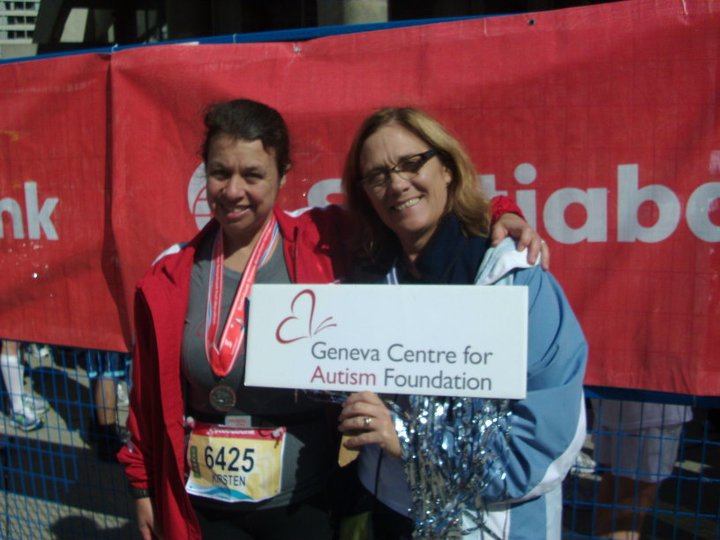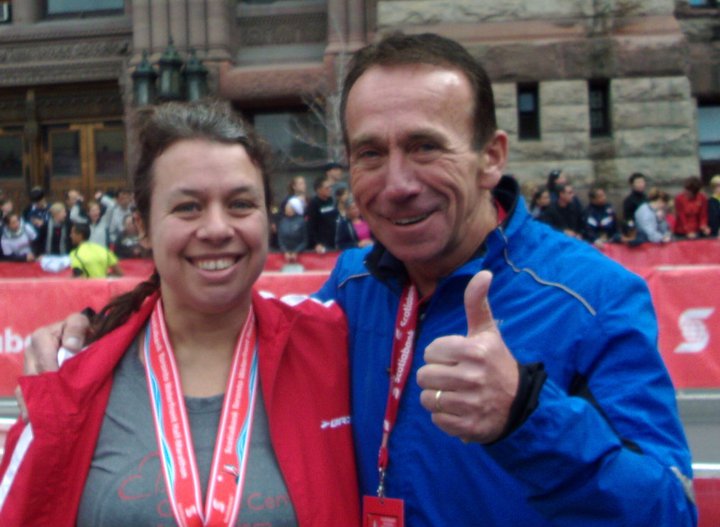Last week I actually thought I was going crazy. I was leading up the Big Race, which meant that I was running 60% of my usual mileage. Which in turn meant that I had this build-up of energy that I could not expend in the way I usually do, which is to lace up my running shoes and hit the road. As a result of all this, I was hovering around at home, engaging in these weird frenetic bursts of activity, filling up everyone’s Facebook walls with meaningless status updates, and generally being a bit of a nuisance. Thanks to over a week of very little sleep, I advanced about eight levels in Frontierville.
I started experiencing odd little aches and twinges – tightness in the glutes, a rickety left ankle, what felt like an impending cold – all carefully designed to mess with my mind and convince me that I was not ready for this race. When I looked back at six months of training, I didn’t see all of the long runs I had clocked up, the hill training or speed reps. I saw the gaps – the long run I missed six weeks ago because of a cold, the two speed training sessions that I was forced to do on a treadmill because of my schedule, the midweek run that I had to cut short because of a thunderstorm.
I was, in other words, experiencing the phenomenon known to runners as taper madness. Some runners are able to completely chill out and relax during their tapering. Others tend to bounce around inside their own heads as if they’re trapped in a pinball machine on steroids. Guess which category I fall into.
On Saturday night I went around the house, setting every audible alarm I could think of. The alarm clock beside the bed. The alarm clock in the living room. The timer on the oven. My BlackBerry. I was so paranoid about oversleeping on the day of the race (never mind that I had been too wired to sleep for a week), and I figured that out of all these alarms, I was bound to hear at least one of them. Of course, all that meant was that on Sunday morning, I woke up at 4:30 and had to creep around the house turning off all the alarms to avoid waking up the kids.
As it happened, my wonderful husband-to-be got me to the starting area without incident, with plenty of time to spare. I checked my bag – a remarkably efficient process, considering I was in a bag-check lineup of maybe 2000 people, and I was in and out of there in less than ten minutes. Then I made my way to a prearranged meeting spot for the Geneva Centre for Autism team photo.
As I lined up at the start line, I could feel those tight glutes, that rickety left ankle, the sense that I was getting a cold and therefore not in the best physical shape. But then magic happened. The starting siren went off and as the crowd surged forward, my glutes instantly loosened up, my ankle found stability, and I was breathing strong and clear. As I crossed the start line, I winged a prayer to whatever supreme being you happen to believe in, put a picture of my son George in my head, and went on my way.
I had a series of mini-goals to accomplish for the race. I knew that the Geneva Centre representative would be at around the 6km mark along with the photographer, so my first goal was to simply get to that point. Once I passed them, I would be almost a third of the way there! As I had thought would happen, I got a great boost of energy from seeing people I knew who were cheering my name, taking my picture, and waving a banner for the cause closest to my heart.
That energy boost was enough to get me to my next mini-goal: the 10km point. I felt a sense of exhiliration as I ran over the timing mats, and shortly after that, I reached the turnaround point. Now I was not only more than halfway, I was physically heading back towards the point from which I had started. I was getting tired and pushing myself harder than I had in my training runs, but by breaking down the large distance into smaller goals, I was able to keep going.
With 8km to go, I started running in 2km increments. I reasoned that no matter how rough I started feeling, I would surely be able to manage 2km. As long as I focused on nothing else – not the full distance of the race, not the distance I had run or the total distance that was still to come – if I focused only on the 2km segment of the moment, I would be fine. I told myself that if things started to get really bad, the only thing I had to do was get to the end of those 2km, and then I would figure out what to do next.
And sure enough, before I knew it, I found myself with 2km to go. I was feeling completely exhausted at that point, feeling as if I had little or nothing left to give. I took one last one-minute walking break, took a deep breath, a braced myself for the finish. With 1km to go, I turned onto Bay Street, and then I knew I would be OK. I knew that the crowds of cheering spectators lining both sides of the street would carry me for the last several hundred metres. The crowds got louder as I got closer to the finish, and despite feeling utterly devoid of energy, I found myself passing other runners leading up to the finish.
I rounded the last bend, and the finish line was in my sights. Right on the other side of the finish line, I could see a welcome and familiar figure – my man, having talked himself into getting a media pass, was crouching there with his video camera. I dug deep, and somehow found a reserve of energy that enabled me to sprint for the last 100 metres. Two hours, twenty-two minutes, and thirty-eight seconds after starting the race, I crossed the finish line, waving both arms triumphantly in the air and smiling so much I thought my face was going to split in two.
Six months of dedicated training, almost $500 raised for the Geneva Centre for Autism (which was part of a total of over $35,000 raised collectively by the Geneva Centre runners), a personal best time for the distance that beat last year’s time by six minutes. What a day. What a phenomenal event to be a part of.
Am I hurting today? You bet. Will I do it again next year? I’ve already started to plan the training! My Run for Autism is over, but only for this year.











